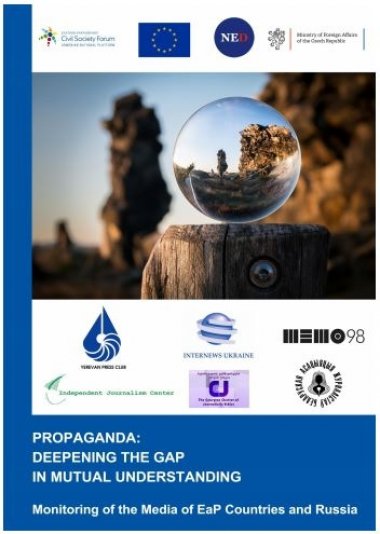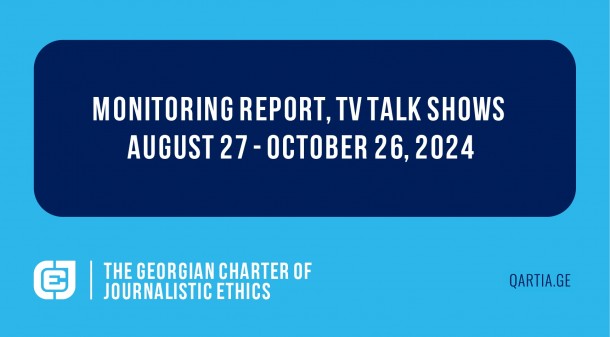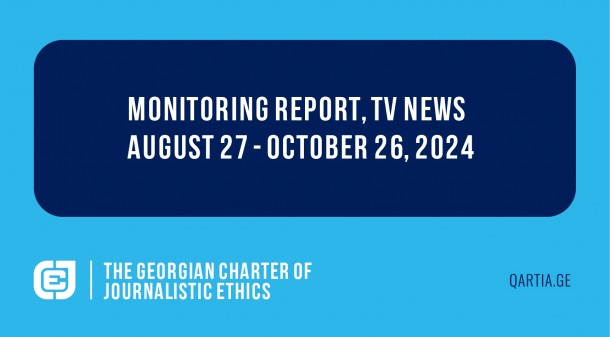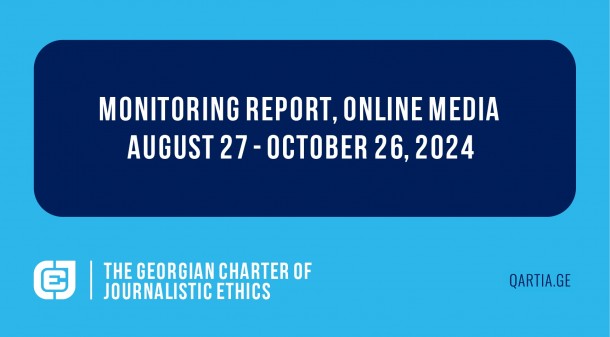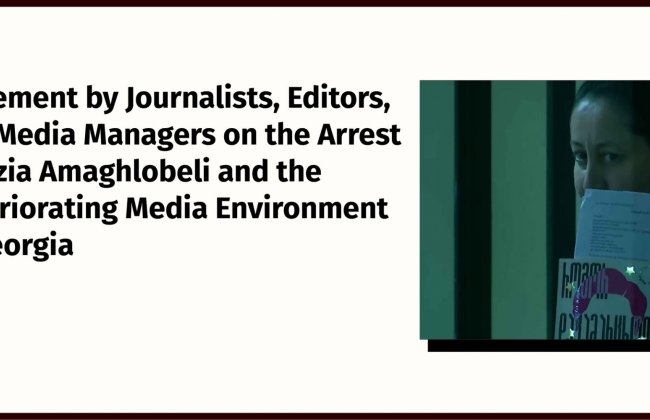Authors of the project assumed that the information space of EaP countries remains unified to a certain extent, and propaganda content spreads not just by itself (mostly, this is conditioned by historical connections and relative absence of language barriers), but also as a result of targeted actions of interested entities. Naturally, Russian media in general play a dominant role in post-Soviet information environment. This refers, first, to federal TV channels, which remain an important player in the media environment of former Soviet republics. The propaganda component of their programmes has a significant impact on the public opinion, particularly in the EaP countries. This circumstance is all the more important, as, given the lack of equivalent information exchange between EaP countries, largely their image of each other is formed indirectly, through Russian media.
For the purposes of this research, "propaganda" refers to media products, which:
- - contain hate speech, discrimination, racism, chauvinism, glorification of war or terrorism, spread of xenophobia
- persistently present controversial issues in a stereotyped, one-sided way
- resort to manipulation of facts for political purposes
- exploit themes of prominent public interest and take advantage of the trust people have towards media in general and in journalism in particular.
| M1 | EU policy is completely dependent on the United States. |
| M2 | The US goal is to weaken the EU and to prevent its rapprochement with Russia. |
| M3 | European Union, its institutions and policies (the Schengen Agreement, Neighborhood policy, social policy, security, etc.) are coming to an end. |
| M4 | The fascist movements/sentiments in Europe have been on rise as a reaction to the influx of migrants; as traditional European policy. |
| M5 | The only salvation for Europe is a closer cooperation with Russia (on the latter’s terms). |
| M6 | Migrant crisis in Europe is a consequence of the Western actions and policies. |
| M7 M8 | Modern Western values are decadent, and only Russia preserved healthy civilizational orientations. Western democracy is a sham and is corrupt, as everybody and everything can be bought there. |
| M9 | International terrorism (radical Islam) is a product of the US policy. |
| M10 | Eastern Partnership is an anti-Russian project aimed to diminish the role of Russia and its influence in the former Soviet Union countries. It leads to the poverty and loss of sovereignty of the partner countries. |
| M11 | Sanctions of the West against Russia are unfair, imposed on EU by the United States and they harm, first of all, Europeans. |
| M12 | Ukraine is a failed state. It is an artificial entity created on the territories of Russia, Poland, Hungary (and so forth). Sooner or later it will collapse as a single independent state. |
| M13 | The governance in Ukraine is captured by radical nationalists (fascists). |
| M14 | Reforms in Ukraine have failed, the level of corruption is higher than during the Yanukovych governance. |
| M15 | The inclusion of Crimea into Russia is a legitimate act of self-determination. Присоединение Крыма к России - легитимный акт самоопределения. |
| M16 | Ukraine is responsible for the failure to comply the Minsk agreements. |
| M17 | If Crimea and Donbas had not come out from the control of Kyiv, their population would have become a victim of nationalist (fascist) terror. |
| M18 | Europe does not need Ukraine. |
| M19 | The future wellbeing of Ukraine and other EaP countries (Armenia, Azerbaijan, Belarus, Georgia, Moldova) is possible only in an alliance with Russia (under the EAEU). |
| M20 | Civil society (NGOs) of Ukraine and/or the country itself (Armenia, Azerbaijan, Belarus, Georgia, Moldova) is a "fifth column" of the West. |
| M21 | Belarusians (Ukrainians) are the same Russians, it is impossible to divide these nations. Highlighting their self-identity is only anti-Russian intrigues of the West. |
| M22 | The delivery of the weaponry to the participants of Karabagh conflict by Russia is a measure to maintain a balance of forces. If Russia did not supply it, someone else would do it with worse consequences for safety. |
| M23 | The resumption of military clashes in Karabagh conflict zone is inspired by Turkey. |
| M24 | Defrost of Karabagh conflict is a consequence of the implementation of the West’s interests. |
| M25 | Anti-Russian movement in Armenia is prepaid by the West. |
| M26 | On the eve of parliamentary elections in Georgia, the West carries out subversive activities against Georgian authorities, who are in favor of cooperation with Russia. |
| M27 | There is pressure (repressions) in Georgia on genuinely patriotic circles, which are eager to protect national identity and resist infusion of alien (Western) values. |
| M28 | Most Moldovan citizens support the rapprochement with Russia (accession to the EAEU) and are against close ties with the West. |
| M29 | Moldova has no chance to survive economically without Russian market, as nobody else needs its products. |
| M30 | The West is seeking to expand its geopolitical presence in Eurasia to weaken Russia. European Union and the US are in a conspiracy against Russia. |
| M31 | RF parliament had to adopt laws stripping Russian civil society of financial aid from the West as the latter tried to meddle in the country’s domestic affairs through CSOs. |
| M32 | NATO deployment of its troops in Eastern Europe and Baltic States poses a direct threat to Russia's security. |
| M33 | The West should respect Russia's status as "equal" partner, accepting its "spheres of influence". |
| M34 | Those Russians (opposition) who criticize the country’s state administration are traitors. |
| M35 | Putin is the best, he is the core of Russian statehood. The main goal of the West is to remove Vladimir Putin. |
| M36 | The West is responsible for the destabilization and wars in the Northern Africa and Middle East. |
| M37 | Turkey supports terrorists in the Syrian conflict (they do not lead a real fight against them). |
| M38 | The West supports terrorists in the Syrian conflict (they do not lead a real fight against them). |
| M39 | The actions taken by the Western coalition in Syria are illegal. |
| M40 | Only Russia is using military force in Syria by the invitation of the legitimate authorities of this country and therefore acts lawfully and effectively. |
| M41 | "Russia stands up from its knees". Russia is progressing despite sanctions, machinations of the West. |
| M42 | Germany, France, Israel (often Italy and other EU countries) are Russia's allies. |
| M43 | Nadezhda Savchenko is a pseudo-politician, radical. She is dangerous for Russia and Ukraine. |
| M44 | Russia, China, India, SCO, BRICS, EAEU are new vectors of geopolitical processes. The activation of trade, economic and investment cooperation within the framework of these alliances/unions is becoming one of the most important components of Russia’s foreign economic strategy and an alternative to Euro-Atlantic alliance. |
The study was carried out by a single methodology, simultaneously in the media of seven countries - Armenia, Azerbaijan, Belarus, Georgia, Moldova, Ukraine and Russia. Apart from the federal Russian TV channels, 16 media of Eastern Partnership countries were selected through consultations with media experts from these countries, as the ones most prone to transmitting "traveling" messages to the national audiences.
Full Version of the report is available here

